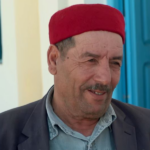Quote:
What are you doing here, my comrade? Ding Ding. Who brought you here through evil betrayal? Ding Ding. Is that the boat that betrayed you? Ding Ding. Or was it the smuggler who lied to you? Ding Ding. How the children drowned in their mother’s arms. Ding Ding. Europe’s peoples thank the smugglers. Ding Ding.
Source:
Deutschlandfunk (02.07.2020): Geflüchtete in Tunesien
Die Toten von Zarzis.
Author Bio:
Mohsen Lihidheb (date of birth unknown), Tunisian fisherman and artist, founder of the Museum of the Sea.
Context:
 Every year, thousands of people make their way from Africa to Europe to flee from poverty, war, discrimination and climate catastrophe. During some periods up to 2,000 people arrive in Lampedusa in a single day (Der Standard, 11 May, 2021). The frequently deadly borders of Fortress Europe are made up of the Atlantic Ocean around the Canary Islands, the Greek border at the Evros river and, above all, the Mediterranean Sea. People on the move are used by politicians for geostrategic purposes (Deutschlandfunk, 29 December, 2021), pushed back by coast guards (Graf 2021), exploited by farmers (globalslaveryindex.org) and interned in camps (Arte TV, 1 December, 2021). But there are also solidarity initiatives and self-organisation by migrants and individuals like Mohsen Lihidheb, who draw attention to the structures of exploitation and push for change to the migration regime.
Every year, thousands of people make their way from Africa to Europe to flee from poverty, war, discrimination and climate catastrophe. During some periods up to 2,000 people arrive in Lampedusa in a single day (Der Standard, 11 May, 2021). The frequently deadly borders of Fortress Europe are made up of the Atlantic Ocean around the Canary Islands, the Greek border at the Evros river and, above all, the Mediterranean Sea. People on the move are used by politicians for geostrategic purposes (Deutschlandfunk, 29 December, 2021), pushed back by coast guards (Graf 2021), exploited by farmers (globalslaveryindex.org) and interned in camps (Arte TV, 1 December, 2021). But there are also solidarity initiatives and self-organisation by migrants and individuals like Mohsen Lihidheb, who draw attention to the structures of exploitation and push for change to the migration regime.Further Reading:
*Der Standard (11.05.2021): Fluchtbewegung im Mittelmeer: Der jährliche Teufelskreis.
*Deutschlandfunk (29.12.2021): Geflüchtete an der polnisch-belarusischen Grenze. Tote im Schnee – und ein grünes Licht der Hoffnung.
*Laura Graf (2021): Pushbacks dokumentieren. Ungehorsame Beobachtungen von Grenzgewalt auf der Balkanroute.
*Global Slavery Index (2018): Country Study Germany.
*Arte (2021): Lager der Schande. Europas Libyen Deal.
Year:
2020